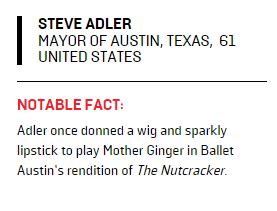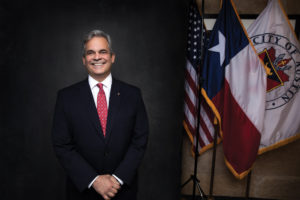On Jan. 28, Austin Mayor Steve Adler was set to give a speech about a perennially sore local  issue: the cost of housing. But the night before, President Donald Trump’s first travel ban sowed chaos around the country, and Adler, struck by the reports of refugees stranded at airports, pivoted from his prepared remarks to champion his city’s values in the face of the administration’s sudden clampdown.
issue: the cost of housing. But the night before, President Donald Trump’s first travel ban sowed chaos around the country, and Adler, struck by the reports of refugees stranded at airports, pivoted from his prepared remarks to champion his city’s values in the face of the administration’s sudden clampdown.
“Immigrants are part of who we are and who we have always been,” Adler declared. “The world can completely lose its mind, and we’re still going to be Austin, Texas.” His audience responded with a standing ovation.
For Adler, those were words to live by in 2017, a year marked by an intense Republican-led effort to reshape U.S. immigration policy. Yet even as Texas lurched further to the political right this year — passing a show-me-your-papers law in May aimed at punishing policies that limit cooperation with federal immigration enforcement — the soft-spoken mayor emerged as one of the fiercest defenders of immigrants’ rights in his state.
“[Mayor Adler] seems to really recognize that the immigrant community is a part of his constituency and has stuck out his neck a lot to support them,” says Robert Painter, the director of pro bono programs and communications at American Gateways, one of the largest immigration legal services providers in Texas.
As the partisan debate raged across the country over sanctuary cities — a loose term with no legal definition that Democrats use to signal openness to immigrants and Republicans equate with the protection of undocumented criminals — Adler argued for cities’ rights to choose their own public safety policies and helped steer the debate to protect his city from losing out on federal funds in the process.
A Democrat who is currently serving his first term as mayor, Adler has long been a public fixture in Austin. Originally from Washington, D.C., he attended the University of Texas School of Law from 1978 to 1982 and says though he came to Austin for the school’s low tuition, it wasn’t long before he fell in love with the city (and its breakfast tacos). The artsy Texan enclave has been his home ever since. He went on to build a thriving eminent domain law practice, representing landowners and protecting nonprofits like the Texas Nature Conservancy against the federal government’s effort to grab its land for a border wall. He first dipped his toe into politics in 1997, taking on the role of chief of staff for then-Democratic State Sen. Eliot Shapleigh, later becoming his general counsel.
In 2014, Adler finally decided to run for office himself. Though he originally campaigned on bread-and-butter issues like overpriced housing and gridlock traffic, in the Trump era he has used his perch to stand up for immigrants, playing a key role in mobilizing Texas mayors to fight the state’s swing to the right this year.
“There’s so much [rhetoric] in this debate on immigration that is not true, pandering to people’s worst fears,” Adler says. “There needed to be as many voices as there could be interjecting the truth.”
For Adler, that meant listening to law enforcement officials when they said they wanted to fight crime, not police immigrant communities. In op-eds and public forums, Adler stood by Travis County Sheriff Sally Hernandez, who refused to comply with federal detention requests starting in January for nonviolent immigration offenders. In response, prominent Republican legislators took to calling her “Sanctuary Sally,” and the state cut $1.5 million in state grants to the county (including Austin) as punishment. With Travis County placed on a Department of Homeland Security sanctuary city report listing localities that refuse to honor some federal immigration detainer requests in March, Austin was clearly in the crosshairs.
 But Adler parried that threat. At an April meeting with mayors in Washington, he backed Attorney General Jeff Sessions into a corner by arguing that Austin hadn’t violated any federal laws that would earn it a sanctuary city distinction. Sessions didn’t challenge him. “I walked directly out of his office to the media,” Adler says. The subsequent headlines read in Adler’s favor: Austin was not, in the Trump administration’s view, a sanctuary city, and it thereby avoided a potential $50 million loss in state and federal funding.
But Adler parried that threat. At an April meeting with mayors in Washington, he backed Attorney General Jeff Sessions into a corner by arguing that Austin hadn’t violated any federal laws that would earn it a sanctuary city distinction. Sessions didn’t challenge him. “I walked directly out of his office to the media,” Adler says. The subsequent headlines read in Adler’s favor: Austin was not, in the Trump administration’s view, a sanctuary city, and it thereby avoided a potential $50 million loss in state and federal funding.
Still, the hard-line Texas state legislature was prepared to go even further. In May, it passed a bill designed to force cities to cooperate more closely with immigration enforcement and allow police officers to inquire about immigration status, threatening fines and even jail time for officials who spoke out against it. In response, Adler joined a lawsuit led by the Mexican American Legal Defense and Educational Fund challenging the law in court. San Antonio, Dallas, and Houston joined, too, presenting a united front of big blue Texas cities opposing the state’s crackdown.
Austin has always prided itself on being a little bit different, but now even booming Texas cities such as Dallas and Houston are attracting residents from all over the country and leaning ever more blue (in 2016 Democratic candidate Hillary Clinton carried six of Texas’s eight most populous counties). It seems that Austin’s values are increasingly coming to define one side of the state’s urban-rural divide.
“Austin is a magical, magical place, and I think that’s due to the people,” Adler says. “The values of inclusion and a welcoming spirit are the DNA of the city.”
Kavitha Surana is a journalist based in Washington and New York.
To read the Mayor’s press release about this, click here.

